Table of Contents
AI website builders are powerful tools that streamline the entire creation process. They can help you with everything from generating an initial design and writing compelling product descriptions to optimizing your site for search engines and even automating marketing tasks. This technology empowers entrepreneurs to focus on what they do best: building their brand and selling their products.
Key Takeaways
- Integrated Platforms Offer the Most Value: While many standalone AI tools exist, a comprehensive platform that combines design, hosting, marketing, and optimization offers the most seamless and powerful solution. An all-in-one ecosystem prevents compatibility issues and streamlines your workflow.
- AI Accelerates Every Stage of Development: Modern AI website builders go beyond simple template suggestions. They assist in strategic planning, content creation (text and images), custom coding, and even post-launch marketing, saving you countless hours.
- Elementor Stands Out as a Comprehensive Solution: Elementor provides an unmatched combination of a powerful AI-driven builder, a dedicated WooCommerce builder for ecommerce, optimized hosting, and a suite of integrated marketing and performance tools, making it the top choice for serious online sellers.
- Customization is Key for Branding: The best AI builders don’t just create generic sites. They provide deep customization options that allow you to create a unique, pixel-perfect online store that perfectly reflects your brand identity.
- Focus on Performance and Scalability: As your business grows, your website needs to grow with it. Choose a builder that is built on a solid foundation (like WordPress) and offers solutions that ensure speed, security, and scalability.
The Evolution of Ecommerce Web Design
Building an online store used to be a complex and expensive undertaking. You had to hire a team of developers and designers, navigate complicated coding languages, and piece together various plugins and services hoping they would all work together. This process was not only time-consuming but also a significant barrier to entry for many aspiring entrepreneurs.
The first generation of website builders simplified this process with drag-and-drop interfaces, but users were still largely responsible for the design, content, and overall strategy. Today, AI-powered builders represent the next major leap forward. These platforms act as an intelligent partner, guiding you through the creation process and automating many of the most challenging tasks.
By analyzing your goals and a few simple prompts, an AI website builder can generate a complete website structure, write persuasive copy, and even create custom images tailored to your brand. This level of automation doesn’t just save time. it democratizes professional web design, allowing small businesses and solo entrepreneurs to compete on a level playing field with larger corporations.
What to Look for in an AI Website Builder for Ecommerce
When evaluating different AI website builders for your online store, it’s important to look beyond the flashy marketing claims. Not all builders are created equal, and the right choice for your business will depend on your specific needs and goals. Here are the key factors to consider:
- Deep Ecommerce Integration: A generic website builder with a simple “add to cart” button won’t cut it. You need a platform with robust ecommerce functionality, including inventory management, secure payment gateways, shipping options, and the ability to customize product pages. A dedicated WooCommerce builder is often the gold standard.
- Comprehensive AI Toolset: Look for a builder that integrates AI across the entire workflow. This includes tools for strategic planning (like sitemaps and wireframes), content generation (text, images, and code), and design assistance.
- Customization and Control: AI should be a starting point, not a limitation. The best platforms use AI to generate a solid foundation, but then give you complete, pixel-perfect control to refine every detail and ensure your store is unique.
- Performance and Scalability: A slow website will kill your conversion rates. Choose a builder that prioritizes performance with features like optimized hosting, image compression, and clean code. The underlying platform should be scalable to handle traffic spikes as your business grows.
- Integrated Ecosystem: Managing a dozen different tools from different vendors is a recipe for headaches. An all-in-one platform that includes hosting, marketing tools (like email and accessibility), and performance utilities provides a seamless, unified experience and a single point of support.
- Foundation and Flexibility: Building on a proven, open-source platform like WordPress gives you unparalleled flexibility. You gain access to a massive ecosystem of plugins and a global community of developers, ensuring your site can adapt to any future need without being locked into a proprietary system.
The 15 Best AI Website Builders for Ecommerce in 2026
Here is a breakdown of the top AI-powered platforms that can help you build and grow a successful online store this year.
1. Elementor: The Complete AI-Powered Web Creation Platform
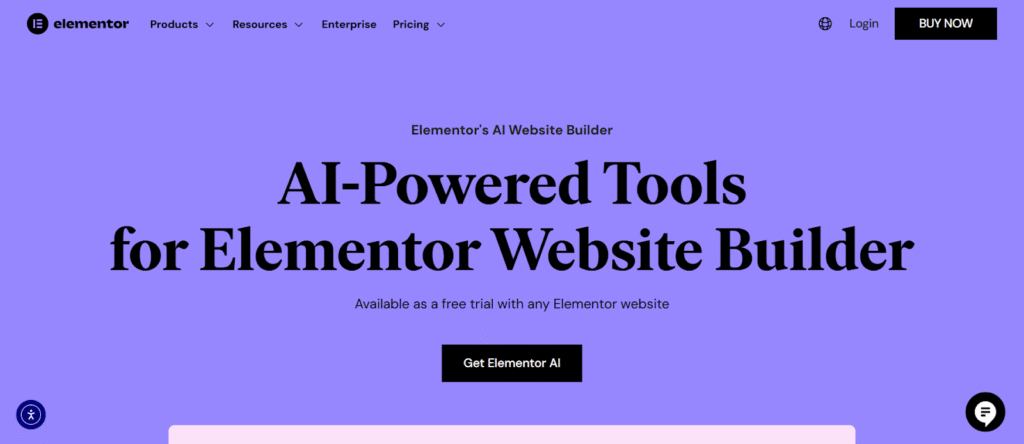
Elementor has evolved far beyond its origins as a page builder to become a comprehensive web creation platform, and it stands out as the most powerful and flexible solution for building an ecommerce website in 2026. It uniquely combines the limitless potential of open-source WordPress with a seamlessly integrated ecosystem of AI tools, optimized hosting, and a dedicated WooCommerce builder, offering the “best of both worlds” for ambitious entrepreneurs.
At its core, Elementor is a no-code, drag-and-drop visual website builder that provides granular, pixel-perfect control over every aspect of your site’s design. However, its true power lies in its fully integrated suite of AI-driven tools that streamline the entire creation process, from initial concept to a fully functional, content-rich online store.
The AI-Powered Workflow Revolution
Elementor’s approach to AI isn’t about isolated features. it’s about creating a cohesive, end-to-end workflow that accelerates every stage of development.
- Elementor AI Site Planner: The process begins with the AI Site Planner, a strategic tool that transforms a simple idea into a professional website brief, sitemap, and interactive, stylized wireframe. Through an intuitive AI-led chat, it helps you define your goals, target audience, and site structure. This condenses what could take days of planning into just a few minutes, providing a clear blueprint for your project and ensuring you start with a solid, strategic foundation.
- Elementor AI: Once you have your plan, you move into the Elementor editor, where Elementor AI acts as your integrated creative partner. Unlike standalone AI tools that disrupt your workflow, Elementor AI is built directly into the editor and is context-aware. This means it understands what you’re working on and provides tailored suggestions.
- AI Content Generation: Overcome writer’s block instantly. Generate compelling headlines, detailed product descriptions, and engaging blog posts directly on the page. You can refine the text, change its tone, translate it into different languages, or simplify complex ideas with a single click.
- AI Image Generation: Stop searching for generic stock photos. Describe the image you need, and the AI will generate unique, high-quality visuals tailored to your brand. You can then use AI to edit, extend, or create variations of these images without ever leaving the editor.
- AI Code Assistant: Need to add some unique styling or functionality? The AI code assistant can generate custom CSS or HTML snippets for you. This makes advanced customization accessible even if you have no coding knowledge, bridging the gap between no-code simplicity and developer-level control.
This seamless progression from the AI Site Planner to the integrated AI tools in the editor creates a continuous, powerful workflow. You can go from a vague idea to a fully designed, content-rich website faster than ever before.
The Ultimate Ecommerce Engine: The WooCommerce Builder
For online stores, Elementor Pro’s WooCommerce Builder is a game-changer. Standard WooCommerce provides limited options for customizing your store’s layout. The WooCommerce Builder unlocks complete design freedom. You can visually design every part of your ecommerce experience, including:
- Custom Product Pages: Create unique layouts for your products that go far beyond the default template. Add custom fields, dynamic content, and tailored upsell sections to maximize conversions.
- Product Archive Templates: Design beautiful, filterable shop pages and category pages that make it easy for customers to browse your catalog.
- Custom Cart and Checkout Pages: Optimize the most critical part of the customer journey by designing a streamlined, branded cart and checkout process to reduce abandonment.
- Dynamic Content: Personalize the shopping experience by displaying content dynamically based on the product, category, or user.
This level of control allows you to create a high-converting, brand-aligned shopping experience that sets you apart from the competition. As web development expert Itamar Haim notes, “The ability to visually construct every single element of the customer’s journey, from the shop page to the final thank you message, is what gives Elementor an unparalleled edge in the ecommerce space. It’s not just about making things look good; it’s about having the power to strategically optimize every touchpoint for conversion.”
A Complete, Optimized Ecosystem
Elementor’s strength extends beyond the builder itself. It offers a suite of integrated products that create a complete, managed platform for your online business.
- Elementor Hosting: To ensure your store is fast, secure, and reliable, Elementor Hosting provides a managed WordPress environment specifically optimized for Elementor. Built on the premium Google Cloud Platform with an integrated Cloudflare Enterprise CDN, it delivers enterprise-grade performance and security. A key advantage is the unified support. if you ever have an issue, you have a single point of contact for everything—the builder, the hosting, and any other Elementor product. Elementor also offers specialized Ecommerce Hosting plans that come pre-packaged with all the tools you need to launch and scale your online store. You can even get a free domain name with annual plans.
- Performance and Utility Tools:
- Image Optimizer: Large images are the number one cause of slow websites. The Image Optimizer by Elementor automatically compresses and converts your images to next-gen formats like WebP, ensuring your site loads quickly without sacrificing quality.
- Site Mailer: WordPress email deliverability is a common pain point. The Site Mailer by Elementor ensures your critical transactional emails (like order confirmations and password resets) reliably reach your customers’ inboxes.
- Accessibility: With Ally by Elementor, you can scan your site for accessibility issues and get guided instructions on how to fix them, ensuring your store is usable by everyone and compliant with global standards.
The Best of Both Worlds
By combining Elementor’s powerful AI website builder and ecommerce tools with its managed hosting and integrated services, you get the seamless, all-in-one experience of a SaaS platform without sacrificing the freedom and flexibility of WordPress. You own your data, have access to a vast ecosystem of third-party plugins, and can customize every aspect of your site. Whether you’re a beginner starting with a pre-designed kit from the template library or a professional designer building a complex store from a blank canvas with the Hello Theme, Elementor provides the tools and scalability you need to succeed.
You can get started with the powerful free version of the builder by visiting the free download page. To unlock the full suite of professional tools, including the WooCommerce Builder and advanced AI capabilities, you’ll need Elementor Pro.
2. Wix ADI (Artificial Design Intelligence)
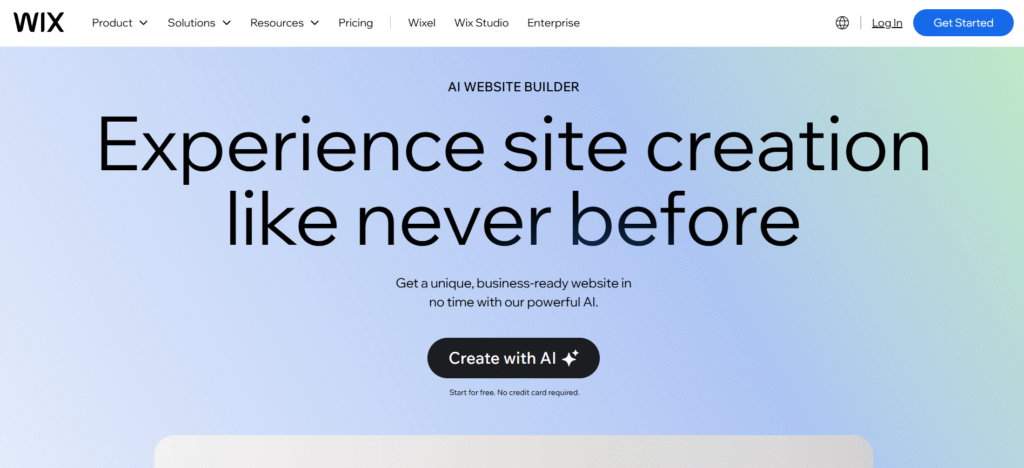
Wix ADI (Artificial Design Intelligence) is a tool designed to help users create a website quickly. It works by asking a series of questions about your business, industry, and design preferences. Based on your answers, it automatically generates a complete website with text and images. This is a good option for beginners who want a simple online presence up and running with minimal effort.
The platform provides a structured design experience. Once the initial site is generated, users can make customizations within a more controlled editor than Wix’s standard editor. For ecommerce, Wix offers integrated business tools, including a storefront, inventory management, and payment processing. The AI can help populate your store with initial product examples.
3. Jimdo Dolphin
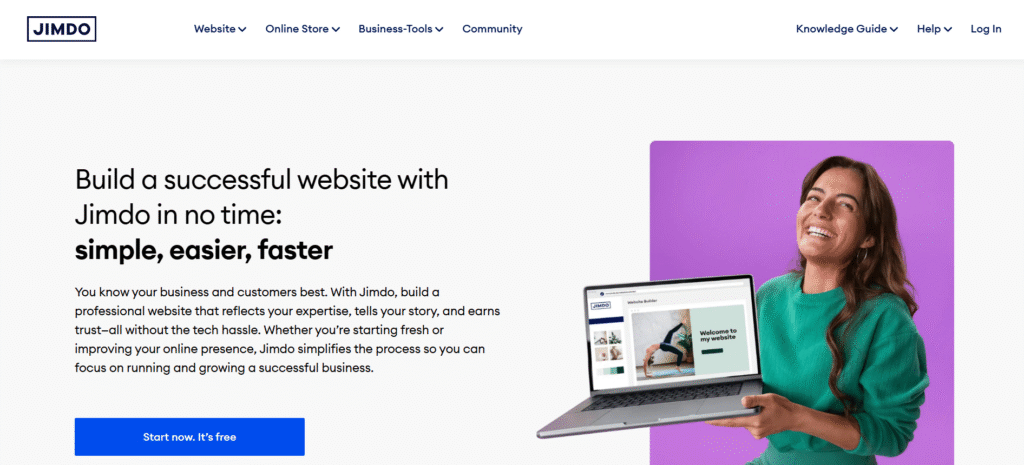
Jimdo Dolphin is another AI-driven website builder focused on speed and simplicity. The process is straightforward: you answer a few questions about your business, and Jimdo’s AI, Dolphin, creates a personalized website in a few minutes. It pulls business information from your social media profiles to help populate the site with relevant content.
For ecommerce, Jimdo provides the necessary tools to sell products online. This includes product listings, payment options, and order management. The design options are more limited compared to more advanced builders, but it’s a functional choice for small businesses or solo entrepreneurs who need a basic online store without a steep learning curve.
4. Hostinger AI Website Builder
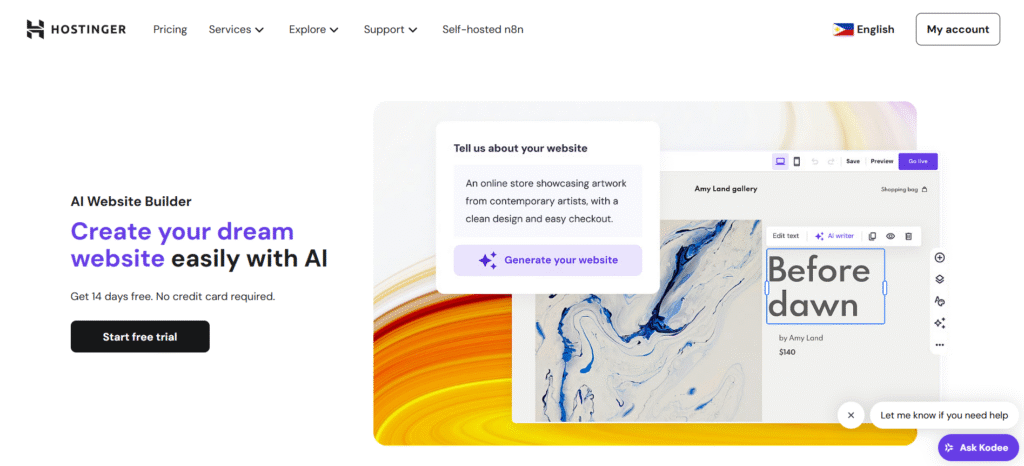
Hostinger’s AI Website Builder is part of its web hosting packages and is designed for users who want an all-in-one solution. The AI tools focus on helping you get started quickly. You can describe your business and the type of website you want, and the AI will generate a unique template with relevant content and images.
The builder includes ecommerce functionality, allowing you to add products, set up shipping, and accept payments. It also features AI-powered tools like a logo maker and an AI writer to help you create content for your site. The platform is geared towards users who prioritize ease of use and the convenience of having their hosting and website builder in one place.
5. Shopify Magic

Shopify is a major platform in the ecommerce space, and it has integrated a suite of AI tools called “Shopify Magic.” These tools are designed to help merchants with various aspects of running their online store. The AI can help write product descriptions, blog posts, and email marketing copy.
Unlike a full AI website builder that designs the site for you, Shopify Magic assists with content creation within the existing Shopify framework. Shopify also has an AI-powered feature for its theme store that can recommend layouts and styles. This makes it a powerful assistant for merchants already committed to the Shopify platform who want to streamline their content and marketing efforts.
6. Framer AI
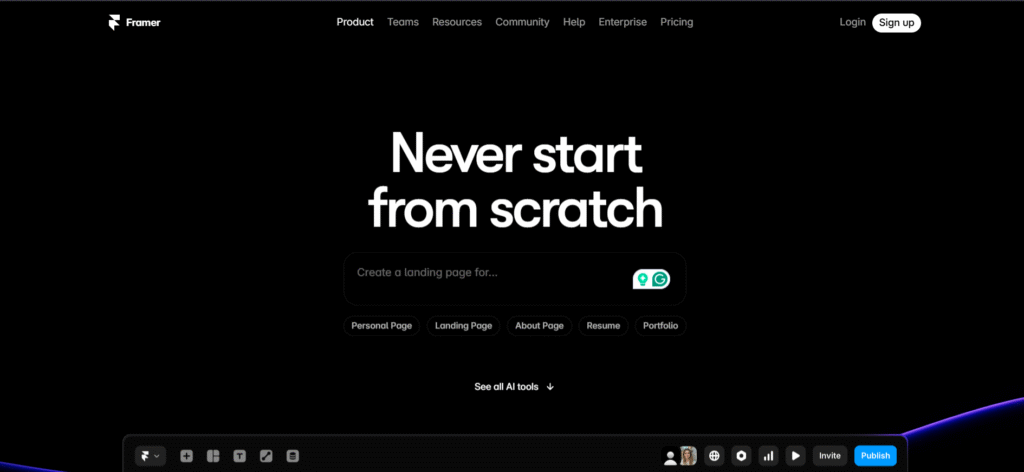
Framer is a design tool that has expanded into a full-fledged website builder with powerful AI capabilities. It is particularly popular among designers who want to create highly interactive and polished websites. Framer’s AI can generate a website from a simple text prompt, and it excels at creating responsive layouts that look great on any device.
For ecommerce, Framer allows you to build custom storefronts, but it often requires more design input than other builders on this list. Its AI can help you create product page layouts, promotional banners, and other design elements. It’s a strong choice for those who have a clear design vision and want an AI partner to help execute it quickly.
7. Durable
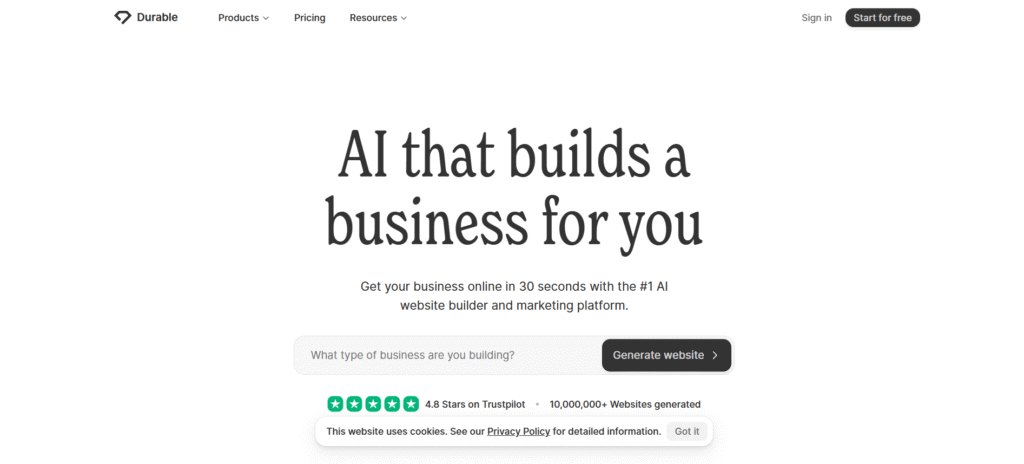
Durable claims to build a website for you in 30 seconds. Its AI-driven process is incredibly fast. You enter your business type and name, and it generates a complete website with a contact form, social media links, and AI-generated copy and images.
Durable’s ecommerce features are suitable for businesses that sell services or a small number of products. It includes tools for invoicing and CRM, making it a functional platform for service-based businesses that also want to sell products online. The emphasis is on speed and providing a complete set of business tools right out of the box.
8. B12
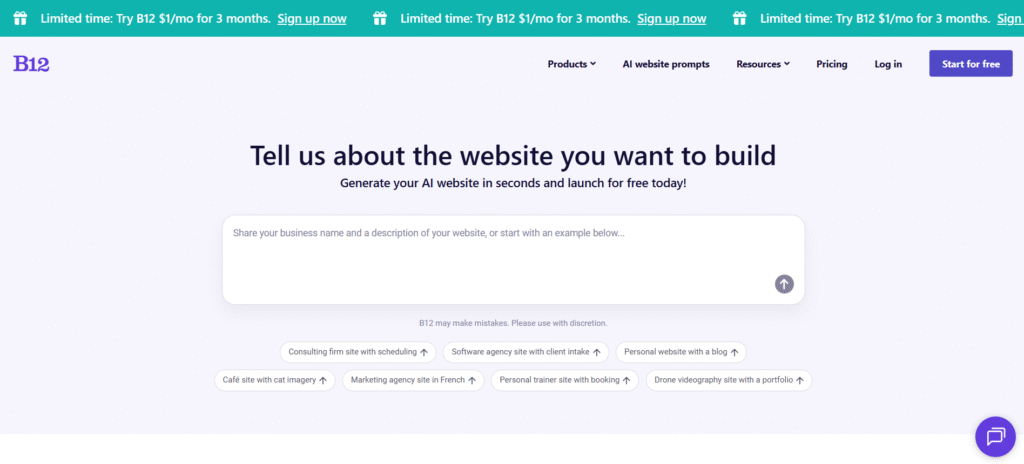
B12 is a hybrid website builder that combines AI with human designers. The process starts with AI, which drafts a website for you based on your industry and goals. The AI generates the structure, copy, and imagery. Then, B12’s team of design experts reviews and refines the website to ensure it is polished and professional before launch.
This approach offers a balance between the speed of AI and the nuance of human expertise. B12’s platform includes ecommerce capabilities, allowing you to create an online store that is both AI-generated and professionally reviewed. It’s a good option for businesses that want a high-quality result without doing all the design work themselves.
9. Kleap
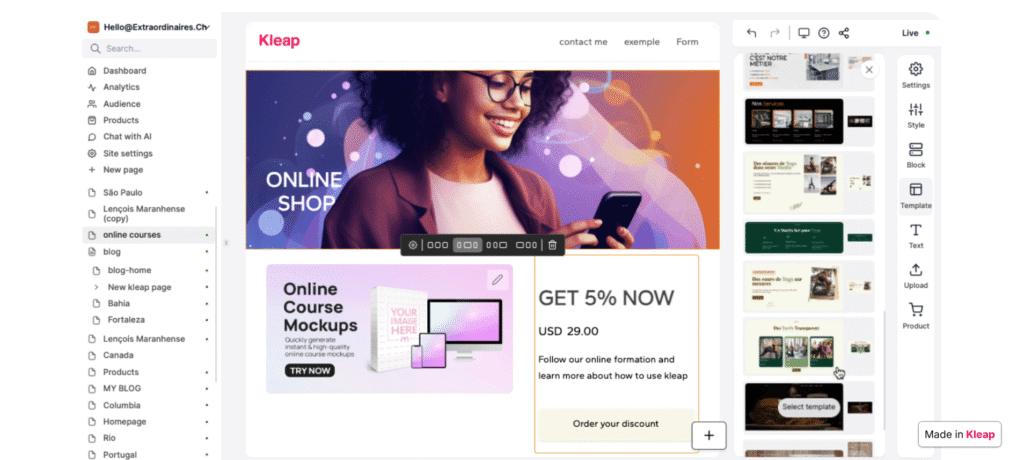
Kleap is a mobile-first AI website builder, designed for entrepreneurs who manage their business primarily from their phone. You can build and manage your entire website, including an online store, directly from their mobile app. The AI asks you questions and then generates a mobile-optimized website for you.
Its ecommerce tools are straightforward, focusing on making it easy to add products, track orders, and manage customers on the go. Kleap is a practical choice for creators, influencers, and small business owners who are highly active on social media and need a quick way to launch a mobile-friendly store.
10. Bookmark AIDA
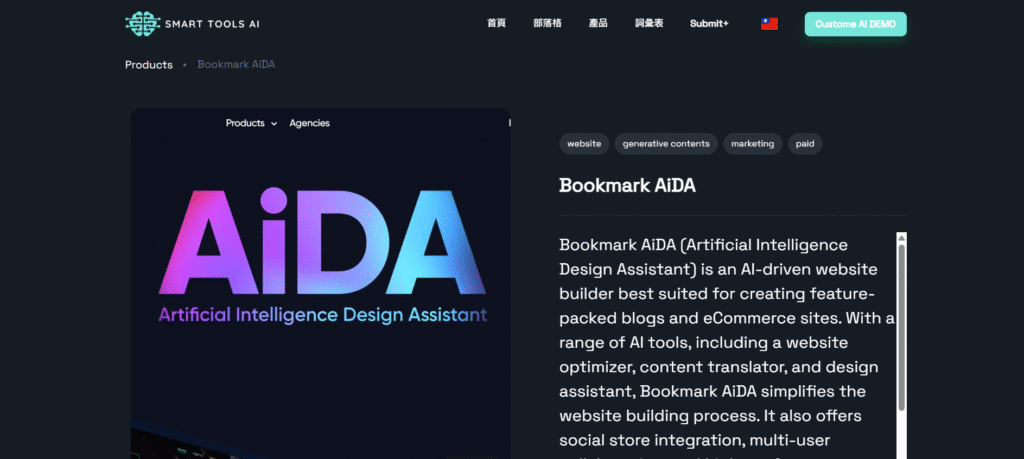
Bookmark’s AI software is called AiDA (Artificial Intelligence Design Assistant). Similar to other AI builders, AiDA creates a website for you after you answer a series of questions. It selects from millions of combinations of design elements to create a unique website tailored to your business.
Bookmark includes ecommerce features, allowing you to build an online store on their platform. One of AiDA’s notable features is that it can help you find and add relevant images and videos to your site. The platform is designed to evolve with your business, suggesting improvements to your site’s SEO and user experience over time.
11. Appy Pie
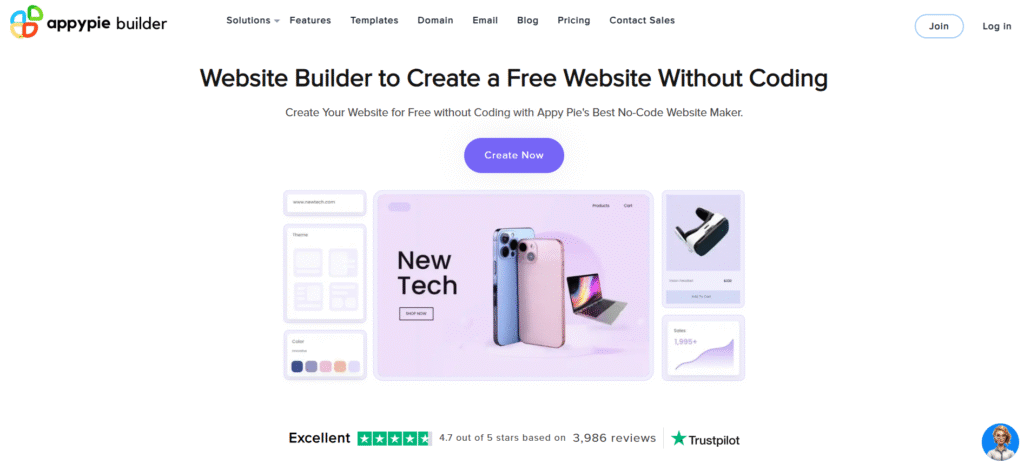
Appy Pie is a no-code development platform that offers a range of tools, including an AI website builder. It is known for its wide array of features that go beyond website creation, such as app building and chatbot integration. The website builder uses AI to help you create a site quickly by selecting building blocks and features relevant to your industry.
The ecommerce functionality is part of its comprehensive feature set. You can create an online store with product pages, a shopping cart, and various payment options. Appy Pie is a choice for businesses looking for a platform that can handle multiple aspects of their digital presence, from their website to a mobile app.
12. TeleportHQ
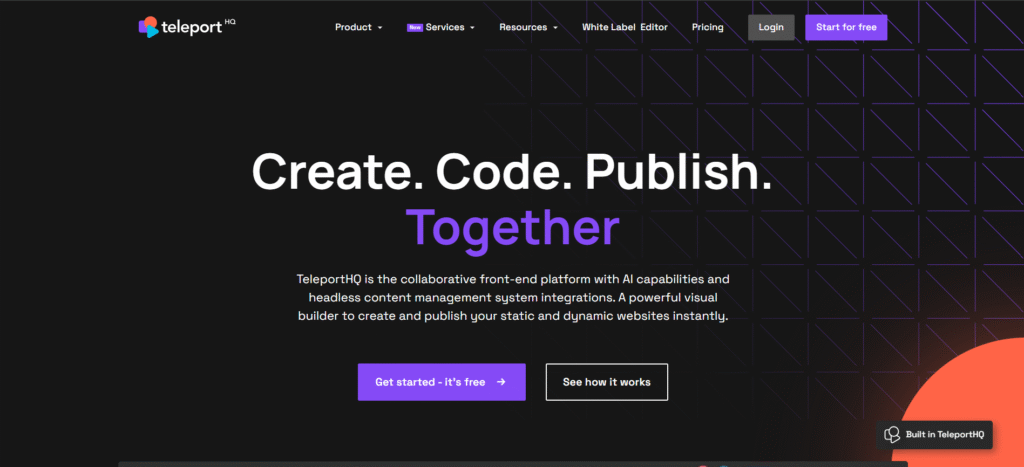
TeleportHQ is a collaborative front-end platform with a strong focus on AI. It is geared more towards developers and designers but includes AI tools that can automate parts of the building process. It can convert hand-drawn wireframes into functional code and uses AI to help with design decisions.
While not a dedicated ecommerce platform, you can use it to design and build custom storefronts that can be integrated with a backend ecommerce system. Its AI features are more technical, focusing on code generation and design-to-code conversion. It is a powerful tool for teams that want to build a highly custom ecommerce front-end with AI assistance.
13. Hocoos

Hocoos is an AI website builder that focuses on creating a professional online presence for small businesses. Its AI wizard guides you through a series of questions to understand your business and then generates a website complete with content and a design that matches your brand.
The platform includes a simple-to-use online store feature. You can add products, manage inventory, and process payments. Hocoos also provides AI tools to help with marketing, such as creating blog content and social media posts. It aims to be an all-in-one solution for small business owners who need a website and basic marketing tools.
14. GetResponse AI Website Builder
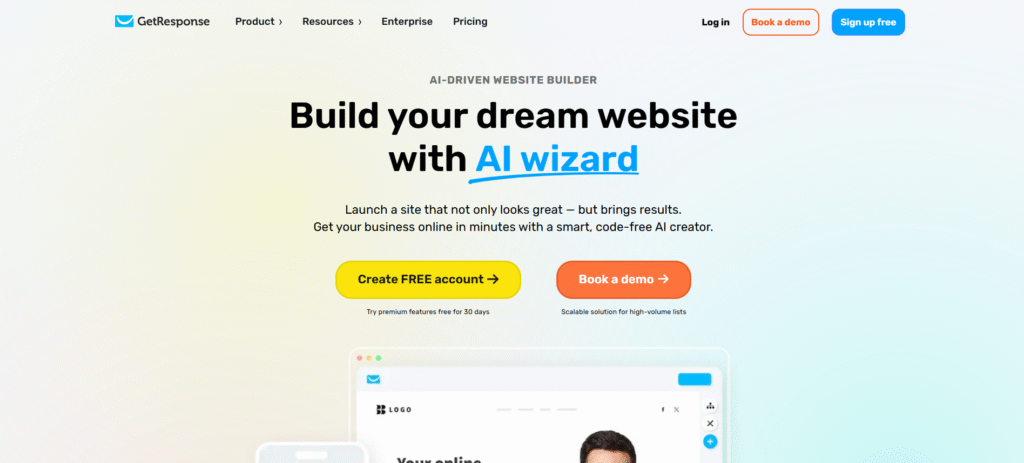
GetResponse is primarily known as an email marketing platform, but it has expanded its offerings to include an AI-powered website builder. The builder uses AI to create a website for you based on your answers to a few questions or by analyzing your existing website or social media profile.
The ecommerce tools are designed to work seamlessly with GetResponse’s marketing automation features. You can build a store, sell products, and then use the integrated email marketing and conversion funnels to promote your store and drive sales. It is a logical choice for users who are already invested in the GetResponse ecosystem for their marketing.
15. Pineapple AI
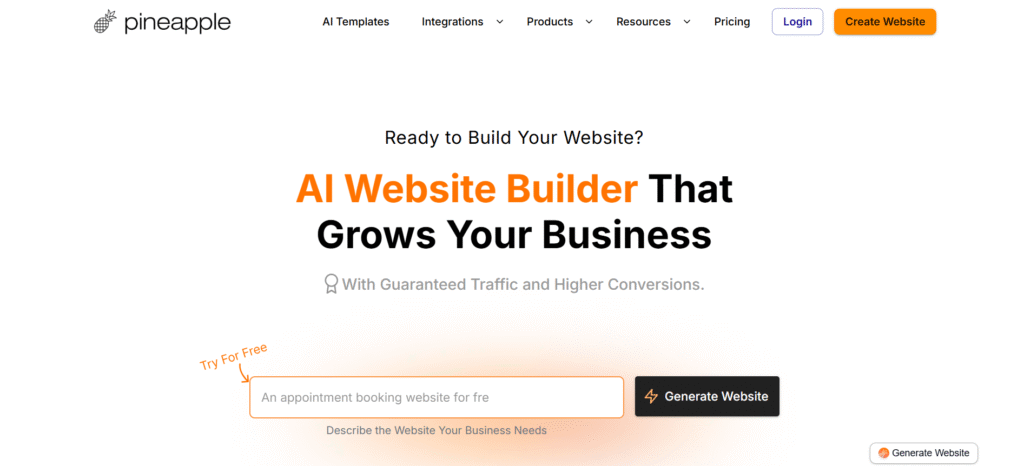
Pineapple AI is a simple and fast AI website builder. You choose a template, and then its AI helps you customize it with generated text and images. The interface is clean and user-friendly, making it accessible for beginners.
It offers basic ecommerce functionality, allowing you to sell products through your site. The focus is less on advanced store management and more on providing a quick and easy way to create a visually appealing website with an integrated store. It’s suitable for individuals or small businesses with straightforward ecommerce needs.
Frequently Asked Questions (FAQ)
1. What is an AI website builder? An AI website builder is a platform that uses artificial intelligence to automate and simplify the process of creating a website. Instead of requiring you to manually design layouts and write content, the AI asks you questions about your business and preferences, then generates a complete, customized website with text, images, and a functional structure.
2. How can AI specifically help an ecommerce website? For ecommerce, AI can be a massive time-saver and conversion-booster. It can:
- Write persuasive and SEO-friendly product descriptions.
- Generate unique images for your products or promotional banners.
- Design and optimize your product pages and checkout process.
- Personalize the shopping experience by recommending products to visitors.
- Automate email marketing campaigns based on customer behavior.
- Help you plan your entire site structure for optimal user navigation.
3. Is Elementor a good choice for someone with no coding experience? Absolutely. Elementor is a completely visual, drag-and-drop builder, meaning you never have to touch a line of code. Its AI tools further simplify the process by generating designs and content for you. For more advanced users, the AI can even generate custom CSS and HTML, but this is entirely optional. It’s designed to be accessible for beginners while offering a high ceiling for professionals.
4. Can I switch from another platform like Shopify or Wix to Elementor? Yes, you can migrate your store to Elementor and WordPress. While it requires moving your product data, the long-term benefits are significant. With Elementor, you gain complete ownership of your site and data, avoid being locked into a proprietary system, and get access to unparalleled design freedom and the vast WordPress plugin ecosystem.
5. What is “headless commerce” and does Elementor support it? Headless commerce is an approach where the front-end of your store (the “head,” or what customers see) is decoupled from the back-end commerce functionality. This allows for greater flexibility in creating custom user experiences. While Elementor is a fully integrated WordPress solution, its flexibility and open nature mean it can be used to create custom front-ends that connect to various ecommerce back-ends via APIs, making it compatible with headless architectures for advanced development projects.
6. How important is hosting for an ecommerce site? Hosting is critically important. The speed, security, and reliability of your online store directly impact your sales and customer trust. A slow-loading site will lead to high cart abandonment rates, while security breaches can be devastating. This is why an integrated solution like Elementor Hosting, which is specifically optimized for the builder and includes enterprise-grade security, is so valuable. It removes the guesswork and ensures your store performs at its best.
7. Do I need to buy a separate theme to use with Elementor? No, you don’t. Elementor is compatible with most WordPress themes. For maximum performance and design freedom, it is recommended to use the free and lightweight Hello Theme. It provides a clean, minimalist foundation, allowing you to have 100% control over the design using the Elementor Pro Theme Builder.
8. What is the difference between Elementor’s free and pro versions for ecommerce? The free version of Elementor is a powerful builder for creating static pages. However, for a fully functional and customized online store, Elementor Pro is essential. The Pro version includes the WooCommerce Builder, which allows you to design your product pages, shop archives, and checkout process. It also includes the Popup Builder, Form Builder, and access to all premium widgets and templates, which are crucial for marketing and conversions.
9. Can Elementor’s AI help with SEO for my store? Yes. Elementor AI can help you write SEO-friendly headlines, meta descriptions, and alt text for your images. Furthermore, Elementor itself is built with clean code that search engines can easily crawl. By using Elementor’s tools to create a well-structured, fast-loading, and content-rich site, you are building a strong foundation for your SEO efforts.
10. Why is building on WordPress with Elementor a better long-term strategy? Building on the open-source WordPress platform gives you ultimate freedom and scalability. You are never locked into a single company’s ecosystem or pricing structure. You own your website and all its data. With over 50,000 plugins available, you can add virtually any functionality you can imagine as your business grows. Elementor enhances this by providing a user-friendly, AI-powered interface on top of this powerful foundation, giving you the best of both worlds: ease of use and limitless potential.
Conclusion: Choosing the Right Partner for Growth
The rise of AI has fundamentally changed the landscape of ecommerce web development. It is now easier and faster than ever to launch a professional, high-performing online store. While many tools can help you get started quickly, the key to long-term success lies in choosing a platform that can grow with your business.
A simple, template-based AI builder might be sufficient for a basic storefront, but ambitious ecommerce entrepreneurs need more. They need a platform that offers deep customization, robust ecommerce functionality, and a suite of integrated tools for marketing, performance, and scalability.
This is where Elementor truly shines. By providing a complete web creation platform that seamlessly integrates a powerful AI-driven builder with a dedicated WooCommerce builder, optimized hosting, and a full suite of essential business tools, Elementor empowers you to build, manage, and scale your online store without compromise. It offers the simplicity and speed of AI automation combined with the unparalleled freedom and power of WordPress, making it the definitive choice for ecommerce success in 2026 and beyond.
Looking for fresh content?
By entering your email, you agree to receive Elementor emails, including marketing emails,
and agree to our Terms & Conditions and Privacy Policy.





